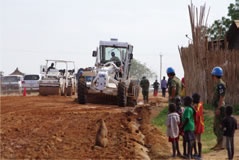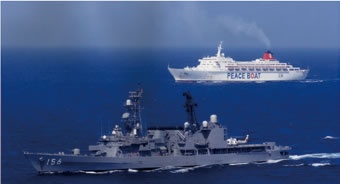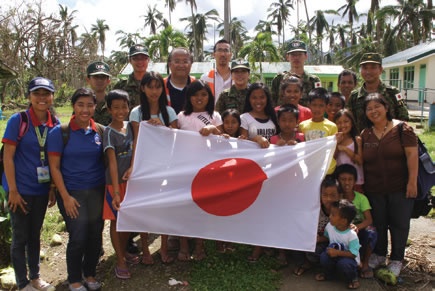Japan's Security Policy
Accomplishing Peaceful and Stable International Community
In order to contribute to realizing a peaceful and stable international community, Japan proactively carries out international cooperation to prevent international terrorism, dispatches personnel to UN PKOs, provides assistance to refugee and conducts post-conflict reconstruction.
UN peacekeeping operations (PKOs)

Local residents watch on as Japanese personnel work on engineering projects in South Sudan.
© MOD
Authorized by UN Security Council (or General Assembly) Resolutions, UN PKOs support the peaceful resolution of conflict and recovery/reconstruction after ceasefire through diverse missions such as ceasefire monitoring to prevent a relapse into conflict and infrastructure development for further peacebuilding.
As of February 2015, Japan has deployed a total of more than 10,000 personnel to 13 UN PKOs. Around 350 SDF personnel are currently deployed to the UN PKO mission in South Sudan where they are developing infrastructure, supporting internally-displaced persons (IDP), and establishing UN facilities.
Anti-piracy operations

Anti-piracy operations off the coast of Somalia and in the Gulf of Aden.
© MOD
The SDF has conducted anti-piracy operations since 2009 in order to ensure the safe passage of ships. Additionally, the SDF has participated in the Combined Task Force 151 (CTF-151) from 2013, and has been conducting zone defense and patrol flights. Furthermore, from the end of May 2015, a Maritime SDF officer has been serving as the commander of the CTF-151.
International disaster relief activities

Japan dispatches Japan Disaster Relief Teams, including SDF Unit, based on requests from a government of an affected country. Thus far Japan has dispatched over 130 Disaster Relief Teams to 41 countries and regions, and SDF has dispatched its unit for 17 disasters and conducted support activities such as transportation and medical assistance.
In response to the typhoon disaster in the Philippines in November 2013, in addition to dispatching Japan Disaster Relief Medical Team and expert teams, Japan also dispatched its largest-ever contingent of SDF Unit of approximately 1,200 personnel.
Development Cooperation Charter
Based on the drastic change of the environment surrounding Japan, as well as the fact that development problems are becoming more diverse, complex and widespread, the Government of Japan revised the ODA Charter for the first time in approximately 12 years and decided on the Development Cooperation Charter. Based on the new Charter and under the policy of “Proactive Contribution to Peace” based on the principle of international cooperation, Japan will contribute even more proactively to peace, stability and prosperity of the international community through “all Japan” cooperation that includes collaboration with the private sector and others. Specifically, Japan will proactively and strategically promote development cooperation with the goals of achieving “quality growth” and poverty eradication through such growth, sharing of universal values, realizing a peaceful and secure society, and building a sustainable and resilient international community through efforts to address global challenges.
Main points of the Development Cooperation Charter
- Philosophy of Japan’s development cooperation
- Proactively contribute to peace, stability and prosperity of the international community as a peace-loving nation
- Development cooperation as a catalyst
- Partnership with private sectors
- Development cooperation in new era
- Sharing universal values and realizing quality growth toward the post-2015 development agenda
- Participation of diverse actors in development
- To realize inclusive and equitable development


